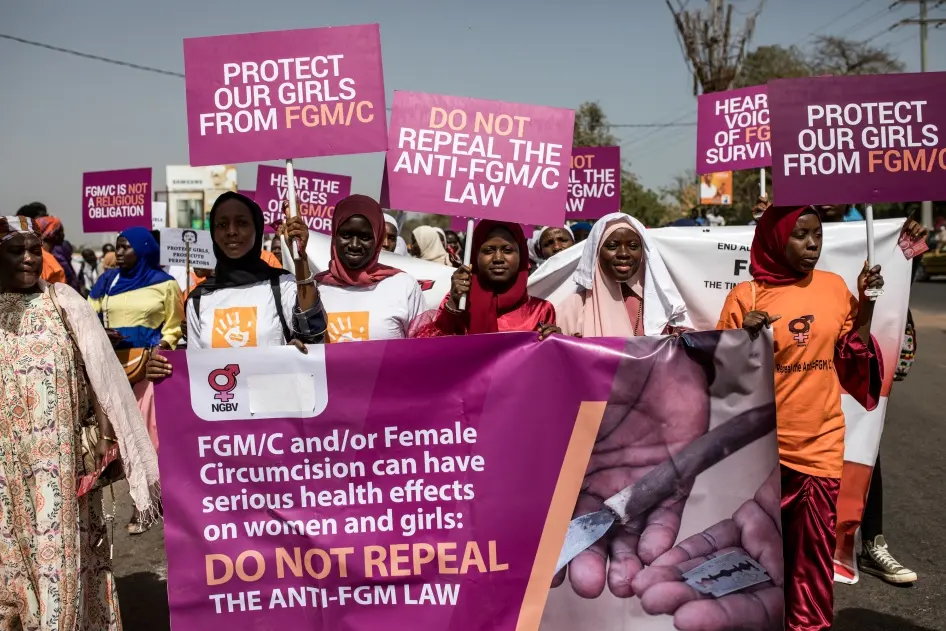Will The Gambia be able to uphold the law against FGM?
"Lifting the ban could hinder anti-FGM campaigns and jeopardise achievements in the area of women's rights."
Dr Natalia Kanem, Director UNFPA
The Gambia is currently at a pivotal point in terms of upholding the ban on female genital mutilation (FGM). In recent years, The Gambia has emerged as one of the leading advocates for the abolition of FGM and has made significant progress towards ending this harmful practice. However, the country now faces an important decision as debates escalate over the possible repeal of the Women's (Amendment) Act 2015, which prohibits FGM/C in The Gambia.
FGM is a violation of the fundamental rights to an intact body.
FGM/C is not only a health issue, but a violation of the fundamental rights of women and girls, including the right to life, health, physical integrity and protection from discrimination and violence. Despite efforts by organisations such as the Gambia Committee on Traditional Practices Affecting the Health of Women and Children (GAMCOTRAP) to raise awareness of the impact of FGM, the practice persists due to deep-rooted cultural beliefs and social pressures.
International organisations such as the World Health Organisation (WHO), the United Nations Children's Fund (UNICEF), the United Nations (UN) and various governments and NGOs have highlighted the serious health consequences of FGM/C for women and girls. Therefore, the proposed Women's (Amendment) Bill 2024 threatens to undo years of education and awareness-raising efforts that have led to the legal prohibition of FGM/C in the country.
75% of women between the ages of 15 and 49 are affected by FGM in The Gambia. (UNFPA)
As staunch advocates for women's rights and the eradication of FGM, it is important to understand the complexity of this issue and to advocate for the continuation of the ban. The Gambia has long been committed to the abolition of FGM, as evidenced by the adoption of the Maputo Protocol in 2003 and subsequent ratification in 2005. In response to a UN resolution, the country enacted a national anti-FGM law in 2015, joining global efforts to combat the practice.
Despite the arguments that lifting the ban on FGM violates religious freedom, it is important to refute this misconception. Islamic scholars have unequivocally stated that FGM is contrary to Islamic principles of integrity and is a cultural, not a religious phenomenon. The repeal of the anti-FGM law in The Gambia is a cause for serious concern at home and across Africa, where FGM is widespread across ethnic, religious and cultural lines.
Islamic scholars have stated unequivocally that FGM contradicts the Islamic principles of integrity and is a cultural, not a religious phenomenon.
Human Rights Watch
Furthermore, lifting the ban could hinder anti-FGM campaigns and jeopardise gains in women's rights, as Dr Natalia Kanem, Director of UNFPA, warned. With only five out of 58 members of parliament being women, there is a clear need for greater gender inclusion in decision-making on women's rights issues.
President Adama Barrow's silence on the issue is causing additional uncertainty, as the decision now depends on a parliamentary committee and a subsequent parliamentary vote. Despite the uncertainty, however, there is also hope, as two petitions have been set up to preserve the law, which have received strong support at national and international level.
The debate surrounding the repeal of the anti-FGM law in The Gambia emphasises the complex interplay between religion, politics and international obligations in the fight against FGM. It is crucial to protect the rights of women and girls and to unequivocally condemn the harmful practice of FGM. The outcome of this legal case could have a profound impact on the ongoing fight against FGM, both in The Gambia and globally.
This is how you can support:
- Sign and share the petitions on Avaaz.org and Change.org
- Share this post on social media and with your social contacts
- Donation to organisations in The Gambia that work against FGM (please contact us if you have any questions)

